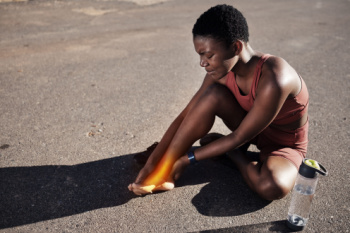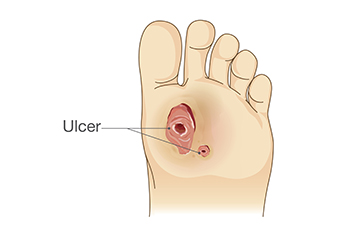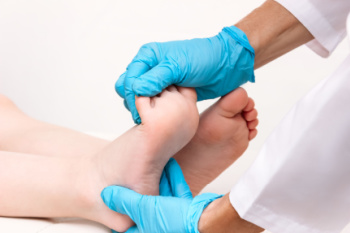Connect With Us
Blog
Items filtered by date: April 2024
Dactylitis and Foot Problems in Children

Dactylitis, commonly known as hand-foot syndrome, and associated with sickle cell disease, or SCD, manifests as painful swelling and inflammation in the fingers and toes, primarily affecting children. The condition arises from obstructed blood flow due to sickle-shaped red blood cells, which leads to tissue damage and discomfort. Treatment focuses on managing SCD symptoms, including pain relief and anti-inflammatory measures. Podiatrists, specializing in foot health, play a vital role in dactylitis management. They diagnose the condition, implement tailored treatment plans, and offer preventive care strategies. Podiatrists educate patients and families on foot hygiene and hydration, minimizing the risk of flare-ups. Regular monitoring by podiatrists ensures early intervention and prevents long-term complications, improving overall quality of life for individuals affected by dactylitis. If your child suffers from dactylitis, it is suggested that you schedule regular appointments with a podiatrist for care.
When dealing with systemic disease of the feet, it is extremely important to check the affected areas routinely so that any additional problems are caught quickly. If you have any concerns about your feet and ankles contact Dr. Nicholas Przystawski from Central Florida Foot Care, PA. Our doctor will assist you with all of your podiatric needs.
Systemic Diseases of the Feet
Systemic diseases affect the whole body, and symptoms usually are displayed in the feet. This condition can make a patient’s ability to walk unbearable. Systemic diseases include gout, diabetes mellitus, neurological disorders, and arthritis.
Gout – is caused by an excess of uric acid in the body. Common symptoms include pain, inflammation, and redness at the metatarsal/phalangeal joint of the base big toe. Gout can be treated by NSAIDs to relieve pain and inflammation, and other drugs that lower the acid levels in the body.
Diabetes mellitus – is an increase in the level of blood sugar that the body cannot counteract with its own insulin. Failure to produce enough insulin is a factor in Diabetes.
Diabetes of the Feet
Diabetic Neuropathy – may lead to damaged nerves and affect the feet through numbness and loss of sensation.
Peripheral Vascular Disease – can restrict the blood flow to the feet, and often times lead to amputation of the feet.
If you have any questions please feel free to contact our office located in Leesburg, FL . We offer the newest diagnostic and treatment technologies for all your foot and ankle needs.
Foot Ulcers From Neuropathy

Neuropathy, a condition often associated with diabetes but not exclusive to it, refers to nerve damage that can result in loss of sensation in the feet. Non-diabetic foot wounds stemming from neuropathy occur due to the inability to perceive pain or pressure, leading to unnoticed injuries that can worsen into ulcers. Without proper sensation, individuals may continue walking on injured feet, exacerbating the wounds. Podiatrists play an important role in managing these ulcers by conducting thorough assessments to determine the extent of damage, implementing preventive measures to alleviate pressure on affected areas, and initiating treatment plans tailored to individual needs. This may involve wound care, infection management, offloading techniques to reduce pressure on the wound site, and patient education on foot care practices to prevent further complications. If you have a foot wound of any type, it is suggested that you schedule an appointment with a podiatrist for immediate treatment.
Wound care is an important part in dealing with diabetes. If you have diabetes and a foot wound or would like more information about wound care for diabetics, consult with Dr. Nicholas Przystawski from Central Florida Foot Care, PA. Our doctor will assess your condition and provide you with quality foot and ankle treatment.
What Is Wound Care?
Wound care is the practice of taking proper care of a wound. This can range from the smallest to the largest of wounds. While everyone can benefit from proper wound care, it is much more important for diabetics. Diabetics often suffer from poor blood circulation which causes wounds to heal much slower than they would in a non-diabetic.
What Is the Importance of Wound Care?
While it may not seem apparent with small ulcers on the foot, for diabetics, any size ulcer can become infected. Diabetics often also suffer from neuropathy, or nerve loss. This means they might not even feel when they have an ulcer on their foot. If the wound becomes severely infected, amputation may be necessary. Therefore, it is of the upmost importance to properly care for any and all foot wounds.
How to Care for Wounds
The best way to care for foot wounds is to prevent them. For diabetics, this means daily inspections of the feet for any signs of abnormalities or ulcers. It is also recommended to see a podiatrist several times a year for a foot inspection. If you do have an ulcer, run the wound under water to clear dirt from the wound; then apply antibiotic ointment to the wound and cover with a bandage. Bandages should be changed daily and keeping pressure off the wound is smart. It is advised to see a podiatrist, who can keep an eye on it.
If you have any questions, please feel free to contact our office located in Leesburg, FL . We offer the newest diagnostic and treatment technologies for all your foot care needs.
Assessing Foot Health

Foot assessment is a fundamental tool in classifying foot types and identifying potential problems. By analyzing the position of the foot at rest and during dynamic movement, podiatrists can infer dynamic foot function and identify abnormalities. Radiologic evaluations serve as the gold standard for assessing foot structure and alignment, providing detailed insight into bone structure and joint alignment. Podiatrists assess feet and conduct thorough evaluations, interpret radiographic findings, and develop tailored treatment plans. Through a combination of physical examination, gait analysis, and imaging techniques, podiatrists can identify conditions such as flat feet, high arches, bunions, and stress fractures, among others. If you would like to understand how your foot structure may be causing your foot problems, it is suggested that you schedule an appointment with this foot doctor for a consultation.
If you have any concerns about your feet, contact Dr. Nicholas Przystawski from Central Florida Foot Care, PA. Our doctor can provide the care you need to keep you pain-free and on your feet.
Biomechanics in Podiatry
Podiatric biomechanics is a particular sector of specialty podiatry with licensed practitioners who are trained to diagnose and treat conditions affecting the foot, ankle and lower leg. Biomechanics deals with the forces that act against the body, causing an interference with the biological structures. It focuses on the movement of the ankle, the foot and the forces that interact with them.
A History of Biomechanics
- Biomechanics dates back to the BC era in Egypt where evidence of professional foot care has been recorded.
- In 1974, biomechanics gained a higher profile from the studies of Merton Root, who claimed that by changing or controlling the forces between the ankle and the foot, corrections or conditions could be implemented to gain strength and coordination in the area.
Modern technological improvements are based on past theories and therapeutic processes that provide a better understanding of podiatric concepts for biomechanics. Computers can provide accurate information about the forces and patterns of the feet and lower legs.
Understanding biomechanics of the feet can help improve and eliminate pain, stopping further stress to the foot.
If you have any questions please feel free to contact our office located in Leesburg, FL . We offer the newest diagnostic and treatment technologies for all your foot and ankle needs.
Long-Term Outlook for a Broken Ankle

A broken ankle, or ankle fracture, occurs when one or more of the bones making up the ankle joint break. This injury often happens due to trauma, such as twisting the ankle during a fall, sports injury, or car accident. Symptoms of a broken ankle include severe pain, swelling, bruising, inability to bear weight, and deformity of the ankle joint. Early intervention by a podiatrist is essential to properly diagnose and treat the fracture. Treatment typically involves immobilization of the ankle with a cast or brace to allow the bones to heal properly. In some cases, surgery may be necessary to realign the bones or stabilize the fracture with hardware. While recovery time varies depending on the severity of the injury, rehabilitation is often recommended to restore strength, flexibility, and function to the ankle joint. If you have sustained an ankle fracture, it is strongly suggested that you schedule an appointment with a podiatrist for proper treatment and rehabilitation, for the best possible outcome with minimal complications.
Broken ankles need immediate treatment. If you are seeking treatment, contact Dr. Nicholas Przystawski from Central Florida Foot Care, PA. Our doctor can provide the care you need to keep you pain-free and on your feet.
Broken Ankles
A broken ankle is experienced when a person fractures their tibia or fibula in the lower leg and ankle area. Both of these bones are attached at the bottom of the leg and combine to form what we know to be our ankle.
When a physician is referring to a break of the ankle, he or she is usually referring to a break in the area where the tibia and fibula are joined to create our ankle joint. Ankles are more prone to fractures because the ankle is an area that suffers a lot of pressure and stress. There are some obvious signs when a person experiences a fractured ankle, and the following symptoms may be present.
Symptoms of a Fractured Ankle
- Excessive pain when the area is touched or when any pressure is placed on the ankle
- Swelling around the area
- Bruising of the area
- Area appears to be deformed
If you suspect an ankle fracture, it is recommended to seek treatment as soon as possible. The sooner you have your podiatrist diagnose the fracture, the quicker you’ll be on the way towards recovery.
If you have any questions, please feel free to contact our office located in Leesburg, FL . We offer the newest diagnostic and treatment technologies for all your foot care needs.
Arthritis Can Cause Pain in the Feet and Ankles
Taking Care of Children’s Feet

Children's feet undergo significant changes as they grow, making proper shoe selection an important consideration. Typically, infants' feet are soft and pliable, with bones gradually forming over time. They usually start walking between nine and 18 months, signaling the need for wearing supportive shoes to protect their delicate feet. As they grow, their feet require shoes with adequate room for movement and growth, typically needing replacements every few months to accommodate size changes. Parents should watch for signs such as blisters, redness, or complaints of discomfort, indicating that shoes may be too small. Regular check-ups with a podiatrist can help address any developmental concerns, such as flat feet or gait abnormalities, ensuring healthy foot development. If you have an infant, it is suggested that you schedule an appointment with a podiatrist for a consultation on proper foot care and footwear to set the foundation for a lifetime of healthy walking and foot function.
Making sure that your children maintain good foot health is very important as they grow. If you have any questions, contact Dr. Nicholas Przystawski of Central Florida Foot Care, PA. Our doctor can provide the care you need to keep you pain-free and on your feet.
Keeping Children's Feet Healthy
Having healthy feet during childhood can help prevent medical problems later in life, namely in the back and legs. As children grow, their feet require different types of care. Here are some things to consider...
Although babies do not walk yet, it is still very important to take care of their feet.
Avoid putting tight shoes or socks on his or her feet.
Allow the baby to stretch and kick his or her feet to feel comfortable.
As a toddler, kids are now on the move and begin to develop differently. At this age, toddlers are getting a feel for walking, so don’t be alarmed if your toddler is unsteady or ‘walks funny’.
As your child gets older, it is important to teach them how to take care of their feet.
Show them proper hygiene to prevent infections such as fungus.
Be watchful for any pain or injury.
Have all injuries checked by a doctor as soon as possible.
Comfortable, protective shoes should always be worn, especially at play.
If you have any questions please feel free to contact our office located in Leesburg, FL . We offer the newest diagnostic and treatment technologies for all your foot and ankle needs.

